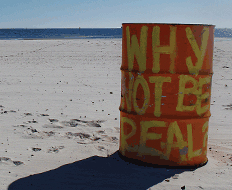There is a constant murmur during the July 27, 2010, Congressional hearing before the Committee on Energy and Commerce. As politicians shuffle in and out from their burgundy leather seats, Ken Feinberg, made famous for distributing insurance claims to 9/11 victims and their families, stays still, hunched over the tabletop microphone in front of him.
He is at the end of the table and photographers from the nation’s biggest news organizations are seated on the floor below him, snapping away as he answers questions about how he will distribute the $20 billion dedicated by BP to repay damages from the historic oil spill.
“I answer to the people of the Gulf, not the administration or BP,” Feinberg says in a thick New England accent that stands in stark contrast to the genteel dialects of the four men seated to his left.
Along with Feinberg are restaurant and tourism leaders from the Gulf Coast. They have come all the way from their oceanfront businesses to the stagnant heat and humidity of the nation’s capital to plead their case. They want to set the record straight, they want money, and they want them both now.
“The rest of the world and the rest of America need to know that it’s safe to get back in the water,” says Rip Daniels, vice president of the Mississippi Gulf Coast Tourism Commission.
It is a little more than four months after the April 20 explosion on the Deepwater Horizon oil rig. In addition to claiming 11 lives, the spill was like throwing a 2-ton boulder into a tranquil pond. Within days it became obvious that the ensuing oil spill would be worse than any in the world’s history. Americans sat glued to their televisions as experts from top universities and even NASA tried to cap the wellhead that was spewing 62,000 barrels of oil a day into the Gulf of Mexico. Meanwhile, business owners along the Gulf sat waiting, waiting for customers to return to their stores and for the media frenzy to die down.
It was the ensuing coverage of the spill with images of oil-soaked birds and flashbacks to the devastation of Hurricane Katrina that quickly did more damage to local businesses and franchisees than the oil spill itself.
“Many ask if there’s oil on the doorsteps of New Orleans; and New Orleans is miles inland,” says Ralph Brennan, president of Ralph Brennan Restaurant Group in New Orleans, to the group of legislators looking back at him. There is desperation in his voice, along with the others who have come to request $500 million in marketing funds to reverse what the talking heads have done over the last 12 weeks.
“The media must be held accountable for its actions,” says Keith Overton, chairman of the Florida Restaurant and Lodging Association, explaining that after the President’s visit to Pensacola, Florida, a cable channel superimposed dripping oil over the background of its coverage of the event.

“Many of us operate at or slightly above minimum wage, and BP was employing people at $11 an hour upward.”
Today, one year after the spill, the media firestorm is still fresh on the mind of Wendy Warren, vice president of communications at the Louisiana Restaurant Association. “The phone started ringing on April 21,” she says. “When people got over the fact that 11 people died and that the oil was gushing into the Gulf of Mexico, people went, ‘Oh my god, this is going to be huge.’ And by that I mean the media.”
Jackson, Mississippi–based Mike Cashion, executive director of the Mississippi Hospitality & Restaurant Association, sits in his office rubbing his forehead. “The perception was that every food item that came out of the Gulf was dripping in oil, and that couldn’t have been further from the truth,” he says.
What was the truth was that the spill occurred just two weeks before the beginning of oyster season in the region. Since fishermen traditionally work to exhaust their stocks of product before a new season begins, locals had been slashing prices on oysters and shrimp in anticipation of the upcoming fishing season. That trend quickly reversed, as businesses realized the impact the spill had on supply chains across the coast. Prices quickly soared since fishermen either couldn’t fish in their regular waters or were recruited by BP as part of the Vessels of Opportunity program to help with the clean-up effort.
While prices of shrimp and oysters hit record highs, causing many restaurateurs to pull the foods from menus altogether, businesses were hit worst by the absence of tourists. “It was very obvious that they weren’t going to arrive, even though we didn’t get the worst of it,” says David Cadwallader, owner of a Biloxi, Mississippi, Sweet Peppers Deli unit. “I just think people became depressed. They kept showing that the beaches were empty, and the jet ski rental guys were just sitting around. That proliferated, and people realized the season wasn’t going to take off.”
Cadwallader, like many in the area, saw his sales fall following the oil spill. “In May we were down $8,000 in sales, and it drifted down every month and stayed at about $8,000. It remained like that until probably the end of the year,” he says.
RPM Pizza, which owns 135 Domino’s locations across Louisiana and Mississippi, followed a similar downturn. “We were up 6 or 7 percent, then all of a sudden we were flat,” says the company’s COO Richard Mueller, describing the company’s performance before and after the spill. “In our business, a couple percentage points in sales is huge because the margins are so thin. And we haven’t seen the trend come back yet.”
[pagebreak]
As CNN crews descended on the small towns along the coast, they were joined by BP clean-up crews comprised of locals paid by the hour to walk the beaches and manually clean up tar patties and oil residue along the shores. Although the effort to restore the beaches in the hardest hit areas, which also included barrier islands, was welcome in the region, BP inadvertently threw off the area’s labor market.
“Many of us operate at or slightly above minimum wage, and BP was employing people at $11 an hour upward,” Cadwallader says. “So the dishwashers disappeared overnight.”
As restaurants sat empty and delivery lines stayed silent, Gulf Coast restaurateurs saw a glimmer of hope in the catering opportunities afforded by BP. Since the company had thousands of workers patrolling the beaches, the lunchbox business was booming for some brands in the area. Sweet Peppers Deli, however, was not one of those companies.
“There were hundreds and hundreds of boxes a day, and at one point they reached over 1,000,” Cadwallader says. “There were also brands that came from out of state to feed some of the clean-up crews. We know for certain that companies from Louisiana and Texas were feeding crews on Harrison [Mississippi] and Hancock [Mississippi] beaches.”
Ironically, Cadwallader’s inability to supplement his lost tourism traffic with catering sales forced him to file for emergency relief from BP.
“A lot of people don’t really want to talk about it,” says Bridgette Varone, executive director of the Gulf Coast chapter of the Mississippi Hospitality & Restaurant Association, of operators’ need to file claims with the oil company. “Since they are asking for a little bit of help, it was never talked about much.”
Despite the 12 months that have passed since the explosion, many business owners are still wading through paperwork along with the nearly half a million other claims being handled by Feinberg’s teams. “Everybody got their first emergency funds,” says Mueller, whose company filed eight moving boxes worth of tax returns and past P&L sheets to its local claims office. “Now we’re starting all over again. We’re in the refile mode.”
First there was the emergency relief. Then there is the hush money. BP will pay individuals $5,000 and businesses $25,000 until August 2013 if they sign off saying they won’t bring legal action against the company. Mueller calls this “ridiculous” and says his company’s damages far exceed the $25,000 BP is offering. Smaller companies, like Sweet Pepper, however, are in the internal struggle of whether to “take the money and run” or to attempt to calculate what the financial damages of an entire lost tourist season plus any future lost revenue might add up to. “That’s a difficult decision, since you don’t know what the long-term effects are,” he says.
The claims process was further complicated when individual employees began getting returns faster than the businesses that employed them—and to a much higher tune. “There’s a couple of articles that call them spillionaires,” Warren says. “The restaurant employees who started getting these big checks were taking vacations around September. So tourism was just beginning to pick back up, but when the restaurants needed them, the employees were all going on vacation.”
To call the absence of crewmembers right when the restaurants finally needed them again a perfect storm seems careless. This is a region accustomed to storms, either natural or manmade, with locals still referring to life before Katrina as “PK” and life after as “a new normal.”
“It was two and a half years of a terrible economy, reduced customer counts, reduced customer spending, increased cost of doing business, and then the oil spill happens and you have this national media exposure that blows the situation out of perspective and it happened right at the beginning of the tourist season,” Cashion says. “What else could happen?”
Next, restaurant owners in the region will stay calm and carry on, waiting for insurance checks to arrive and customers to return. It’s their ability to pull themselves up by their bootstraps that has earned them a reputation for being some of the most resilient operators in the nation.
Jeff Descher, a 20-unit McDonald’s owner/operator, lost two stores to Katrina but was luckily not affected by the oil spill. “It’s made us resilient but also has made us come back more aware that we have to do everything we can to help anybody else out,” he says. “Everybody in the region got that during the storm.”
Some restaurateurs are having that lesson tested again, as everyone tries to convince would-be vacationers that the beaches are clean and that the seafood is safe. Millions of dollars in marketing messages are flying out of the region onto social media networks and billboards throughout the South. “They want to be here and don’t want to be anywhere else,” says Mueller of his fellow restaurateurs. “It’s the mentality of, ‘I’m going to make it work.’”
The reality is the region will make it work, but not without the help of the oil company that caused the devastation in the first place. Locals say that BP’s responsibility in the region is far from fulfilled and agree that only through long-term financial and environmental investment will the region come back to its PK glory.
Besides what BP owes the residents in sweat and financial equity, there is still the lingering concern that settled oil will resurface again. Or, worst yet, that a similar spill could happen in the future.
“What if this happens again?” Warren asks. The question lingers without a response.
Of course, there is no real answer other than the wills of the residents in the region would be tested yet again, and that they’d more than likely brush off and get back to work. It’s all they know, and Katrina, the BP oil spill, nor any future disaster is likely to change their positive outlook.
“They’ll come back,” Mueller says of the tourists that are his livelihood. “The beaches are clean, and Americans have short memories.”












